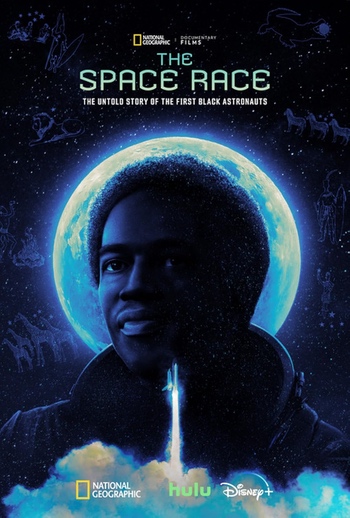Review: The Space Raceby Jeff Foust
|
| “I avoided the guy,” Bluford said of George Abbey. “I figured the less he knew about me, the better. I really didn’t want to be the first Black astronaut.” |
Epps is hardly the first Black person to face challenges in getting to space. The documentary The Space Race, which premiered last week and is available on the Disney+ and Hulu streaming services, describes the far greater obstacles faced decades ago by Black Americans in their quest to become astronauts.
The closest thing to a central character in the film is a man who did not go to space: Ed Dwight. He was a US Air Force pilot identified by the White House as a prospective astronaut as part of a campaign promise that John F. Kennedy made. He describes being at the heart of a complex situation: the White House advanced him, but did little to smooth his path; civil rights groups promoted and praised him publicly, but also criticized him for not doing enough to advance their causes; and there was strong opposition to him within the military and NASA. “There was no way in God’s green Earth they were going to let me be equal to these guys,” he said of his chance of joining the original Mercury Seven astronauts. Dwight was not selected in a later NASA astronaut class and later left the Air Force.
The film moves ahead to the 1970s, when NASA did openly seek Black astronaut candidates for the first time, including through a famous recruiting campaign that featured Star Trek actress Nichelle Nichols. It was effective: “I know she was talking to me. Others claim she was talking to them. No, she was talking to me,” recalled Fred Gregory, an Air Force pilot who was one of the three Black men selected in that 1978 class, along with Guy Bluford and Ron McNair.
The three got their share of media attention as they went through astronaut training, along with at least a low-key competition among them about who would be first to fly. (“I don’t remember competing, but I’m told there was competition,” Gregory said.) That honor eventually went to Bluford, although he said it wasn’t because he was lobbying the key decisionmaker at the Johnson Space Center, the legendary George Abbey: “I avoided the guy. I figured the less he knew about me, the better. I really didn’t want to be the first Black astronaut.”
| “I know she was talking to me. Others claim she was talking to them. No, she was talking to me,” Gregory said of the recruitment ads featuring Nichols. |
Bluford was the first Black American, but the not the first Black person: Arnaldo Tamayo Méndez of Cuba went to space on a Soviet mission in 1980. NASA’s own Black astronauts said in the film that they were unaware of him at the time; historians later noted that Tamayo’s African heritage wasn’t emphasized until later (see “Review: NASA and the Long Civil Rights Movement”, The Space Review, December 23, 2019.) Tamayo is briefly interviewed in the film, where he claims the US censored any Cuban accomplishments, an allegation the filmmakers don’t challenge.
The film focuses on the experiences of Bluford, Gregory, and McNair (in his case from recollections of others and archival footage, as he died in the Challenger accident) as well as Charlie Bolden, another early NASA Black astronaut who went on to become NASA administrator. It also features a few others, like Bernard Harris and Leland Melvin, as well as current NASA astronaut Victor Glover, who recalls the support he got from other Black astronauts while he was in orbit on the Crew-1 mission a few years ago, not long after the murder of George Floyd and subsequent Black Lives Matters protests. Notably, Black women astronauts are mentioned only in passing in the film and not interviewed; no discussion, for example, of any dual challenges they encountered by both being Black and female.
In a scene late in the film, Glover and Dwight hold a video call with Jessica Watkins while she was on the station in 2022. “We are just so grateful for the path that you laid for us to follow behind,” she tells Dwight. “Thanks for remembering me,” Dwight responds. The Space Race will help many remember him and other trailblazers.
Note: we are now moderating comments. There will be a delay in posting comments and no guarantee that all submitted comments will be posted.
